七年级下册英语知识点复习(2)
(完整版)新版新目标英语七年级下册unit2知识点总结

Unit 2 What time do you go to school?Section A1.get dressed 穿衣服表示穿的动作be dressed in+颜色/衣服穿着表示穿的状态2.brush one’s teeth 刷牙brush n 刷子brushes v 刷take a shower=have a shower 洗澡3.(1)what time 几点问具体时间,一般回答要具体到小时(2)when对时间提问,询问日期、月份、年份,回答既可是具体的时间,也可是不具体的时间,in the morning,last year,in 1998 等范围大的时间,When does he take a shower?他什么时候洗澡?He takes a shower in the morning. 他在早上洗澡。
I take a shower at 6 o’clock in the morning.我早上六点洗澡。
4.at in on(1)at + 具体时间点,在几点(几分)固定搭配at 7:00 at night at noon(2)in + 时间段(周,年份,月份,季节,早中晚)in 1942 in the morning in May(3)on + 星期/日期/节日或具体某一天的早中晚on a cold winter night on Children’s Day on Monday5. always usually often sometimes 频度副词,常用于动词be 助动词或情态动词之后,行为动词之前。
(1)always(100%) 总是、永远,表动作重复,状态继续,中间没间断,通常修饰动词的一般时态。
若修饰进行时,则有“老是”,“再三地”的意思,带有厌烦、不满、赞美等感情色彩。
(2)usually(80%)通常,着重表示已习惯的动作。
反义词unusually(3)often(60%)时常、经常,表示常常这样,但不总是这样,反义词seldom(4)sometimes(30%)有时、不时,说明的是偶尔发生的事情或情况。
Unit 2 知识点梳理-牛津译林版七年级英语下册

牛津译林版七下Unit 2 知识点梳理1.Where are you going?你要去哪儿?现在进行时表将来。
现在进行时可用于表示计划或安排将要发生的动作,go,come,leave等表示位移的动词,都可以用现在进行时表示将来。
2.I’m going to visit our new neighbours. 我打算去拜访我们的新邻居。
neighbour “附近的人或物”(侧重指人)neighbourhood “邻近街区,居民区”(侧重指地方)3.I’m afraid they won’t welcome visitors like you. 恐怕他们不会欢迎像你这样的客人。
I’m afraid + (that) 从句. “恐怕……”,常有“抱歉”之意。
I’m afraid not.(恐怕不是)I’m afraid so.(恐怕如此)be afraid to do sth.“害怕/不敢去做某事”be afraid of sb./sth.“害怕某人/某物”be afraid of doing sth. “害怕/担心做某事”be afraid for “为……担心”visitor:n. “访问者,参观者”动词加-er或-or变成名词,表示从事该职业的人。
like:prep. “像……一样,相似”。
反义:unlikelook like “看起来像”;be like “像”辨析:like/aslike:强调“如同……一样,如……一般”。
用于相似关系,即两者在形态上或者性质上有相似之处,但并不等同。
as:表示“以……的身份;作为”。
用于说明同一关系,即两者实为一体。
作动词,“喜欢”。
like doing sth.“喜欢做某事”。
4.How many buildings are there in your neighbourhood? 在你的居民区里有多少幢楼?how相关短语:how much:“多少”,提问物品价格或不可数名词。
牛津上海七年级英语下知识点复习汇总Unit 2 Going to see a film
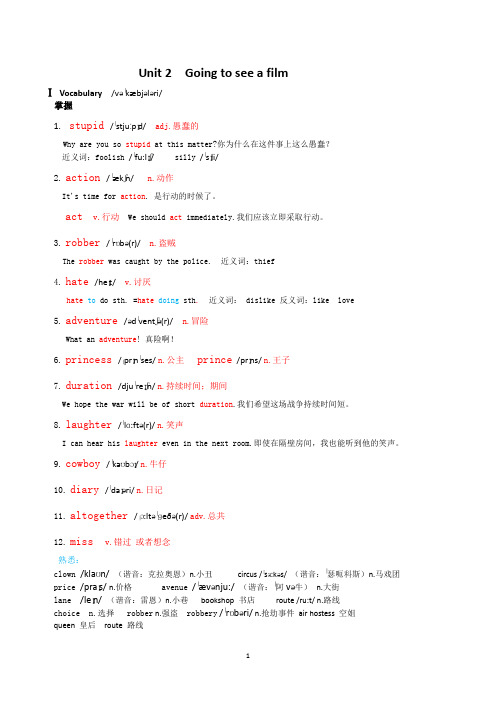
Unit 2 Going to see a filmⅠVocabulary/vəˈkæbjələri/掌握1. stupid /ˈstjuːpɪd/ adj.愚蠢的Why are you so stupid at this matter?你为什么在这件事上这么愚蠢?近义词:foolish /ˈfu:lɪʃ/ silly /ˈsɪli/2.action /ˈækʃn/ n.动作It's time for action. 是行动的时候了。
act v.行动We should act immediately.我们应该立即采取行动。
3.robber /ˈrɒbə(r)/ n.盗贼The robber was caught by the police. 近义词:thief4.hate /heɪt/ v.讨厌hate to do sth. =hate doing sth. 近义词: dislike 反义词:like love5.adventure /ədˈventʃə(r)/ n.冒险What an adventure! 真险啊!6.princess /ˌprɪnˈses/ n.公主prince/prɪns/ n.王子7.duration /djuˈreɪʃn/ n.持续时间;期间We hope the war will be of short duration.我们希望这场战争持续时间短。
ughter /ˈlɑ:ftə(r)/ n.笑声I can hear his laughter even in the next room.即使在隔壁房间,我也能听到他的笑声。
9.cowboy /ˈkaʊbɔɪ/ n.牛仔10.diary /ˈdaɪəri/ n.日记11.altogether /ˌɔ:ltəˈɡeðə(r)/ adv.总共12.miss v.错过或者想念熟悉:clown/klaʊn/ (谐音:克拉奥恩)n.小丑circus /ˈsɜ:kəs/ (谐音:ˈ瑟呃科斯)n.马戏团price /praɪs/ n.价格 avenue /ˈævənju:/ (谐音:ˈ阿və牛)n.大街lane /leɪn/ (谐音:雷恩)n.小巷bookshop 书店route /ru:t/ n.路线choice n.选择 robber n.强盗 robbery/ˈrɒbəri/ n.抢劫事件air hostess 空姐queen 皇后route 路线ⅡPhrase /freɪz/1.take a look=have a look 看一看let's take/have a look around the exhibition./ˌeksɪˈbɪʃn/ n.展览咱们看看展览吧。
牛津译林版七年级下册英语 Unit2 知识点总结-最新
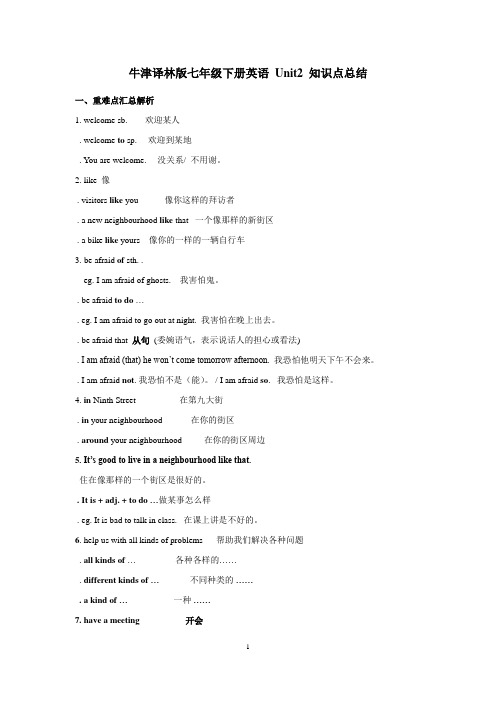
牛津译林版七年级下册英语Unit2 知识点总结一、重难点汇总解析1. welcome sb. 欢迎某人. welcome to sp. 欢迎到某地. You are welcome. 没关系/ 不用谢。
2. like 像. visitors like you 像你这样的拜访者. a new neighbourhood like that 一个像那样的新街区. a bike like yours 像你的一样的一辆自行车3.be afraid of sth. .eg. I am afraid of ghosts. 我害怕鬼。
. be afraid to do…. eg. I am afraid to go out at night. 我害怕在晚上出去。
. be afraid that 从句(委婉语气,表示说话人的担心或看法). I am afraid (that) he won’t come tomorrow afternoon.我恐怕他明天下午不会来。
. I am afraid not. 我恐怕不是(能)。
/ I am afraid so. 我恐怕是这样。
4. in Ninth Street 在第九大街. in your neighbourhood 在你的街区. around your neighbourhood 在你的街区周边5. It’s good to live in a neighbourhood like that.住在像那样的一个街区是很好的。
. It is + adj. + to do …做某事怎么样. eg. It is bad to talk in class. 在课上讲是不好的。
6. help us with all kinds of problems 帮助我们解决各种问题. all kinds of …各种各样的……. different kinds of …不同种类的……. a kind of …一种……7. have a meeting 开会. have a class meeting 开一次班会. have a parents’ meeting 开一次家长会. have a sports meeting 开一次运动会8. There is something wrong with my computer. 我的电脑出了一些毛病。
人教版七年级英语下册Unit2知识点归纳
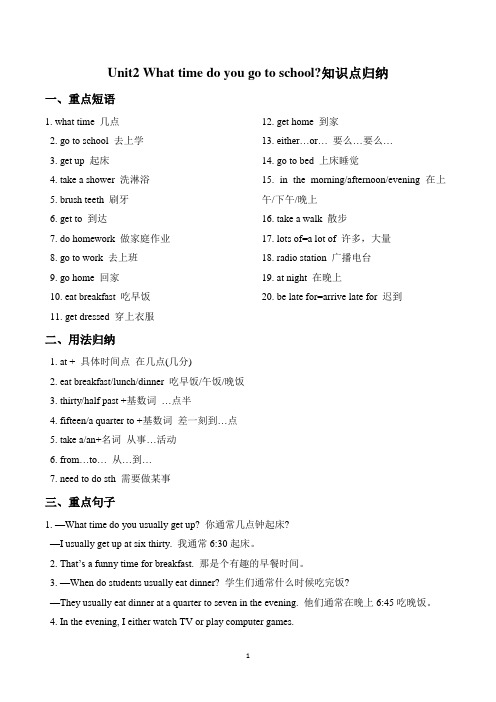
Unit2 What time do you go to school?知识点归纳一、重点短语1. what time 几点2. go to school 去上学3. get up 起床4. take a shower 洗淋浴5. brush teeth 刷牙6. get to 到达7. do homework 做家庭作业8. go to work 去上班9. go home 回家10. eat breakfast 吃早饭11. get dressed 穿上衣服12. get home 到家13. either…or… 要么…要么…14. go to bed 上床睡觉15. in the morning/afternoon/evening 在上午/下午/晚上16. take a walk 散步17. lots of=a lot of 许多,大量18. radio station 广播电台19. at night 在晚上20. be late for=arrive late for 迟到二、用法归纳1. at + 具体时间点在几点(几分)2. eat breakfast/lunch/dinner 吃早饭/午饭/晚饭3. thirty/half past +基数词…点半4. fifteen/a quarter to +基数词差一刻到…点5. take a/an+名词从事…活动6. from…to… 从…到…7. need to do sth 需要做某事三、重点句子1. —What time do you usually get up? 你通常几点钟起床?—I usually get up at six thirty. 我通常6:30起床。
2. That’s a funny time for breakfast. 那是个有趣的早餐时间。
3. —When do students usually eat dinner? 学生们通常什么时候吃完饭?—They usually eat dinner at a quarter to seven in the evening. 他们通常在晚上6:45吃晚饭。
人教版七年级英语下册Unit 2知识点汇总
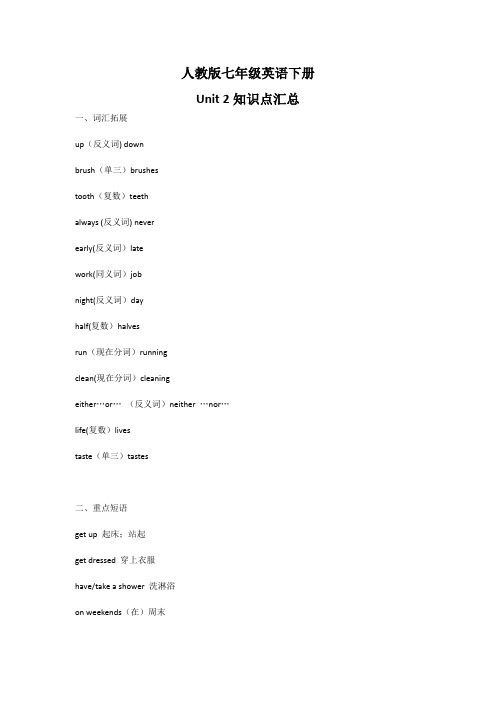
人教版七年级英语下册Unit 2知识点汇总一、词汇拓展up(反义词) downbrush(单三)brushestooth(复数)teethalways (反义词) neverearly(反义词)latework(同义词)jobnight(反义词)dayhalf(复数)halvesrun(现在分词)runningclean(现在分词)cleaningeither…or…(反义词)neither …nor…life(复数)livestaste(单三)tastes二、重点短语get up 起床;站起get dressed 穿上衣服have/take a shower 洗淋浴on weekends(在)周末do (one’s) homework 做作业take a walk 散步;走一走lots of=many+可数(复数)大量,许多either…or... 要么…要么…;或者………或者…brush teeth 刷牙have(eat) breakfast /dinner吃早餐/晚餐go to school 去学校at night 在晚上from…to…从……到……in the morning/ afternoon /evening 在上午/下午/晚上go to work 去上班That's a funny time for…那是做……有意思的时间。
be late for………迟到on school days 在上学期间a quarter past /to+钟点数……过/差一刻钟go to bed 上床睡觉half past +钟点数……点半go home回家eat quickly 吃得快play sports 做运动have much time for …有许多时间做……for half an hour 半小时get home 到家eat a good breakfast 早餐吃得好,好好吃一顿早餐eat …for lunch午餐吃……after lunch /dinner 午餐/晚餐后be (not) good for 对……健康有(没)益taste good 尝起来好吃have a very healthy life 有健康的生活need to do …需要做……from Monday to Friday从周一到周五radio station 广播电台make breakfast for sb. 替某人做早饭get to school 到校三、经典句型1.---What time do you usually get up,Rick?里克,你通常几点起床?---I usually get up at six thirty.我通常六点半起床2.---When does Scott go to work?斯科特什么时候去上班?---He always goes to work at eleven o'clock.他总是在十一点去上班。
人教版七年级英语下复习Unit2 What time do you go to schoo

(2013·山东潍坊)When did the terrible earthquake happen in Sichuan? It happened_____8:02____the morning of April 20th,2013.
A.on;in B.at;on C.at;in D.on;on
go home 回家 letter n.信
around adv.大约
start v.开始;出发 write v.书写;写
tell v.告诉;讲述 me pron.我(I的宾格)
soon adv.不久
wish n.希望;祝愿
best (good,well最高级)最好的(地)
Saturday n.星期六 am (a.m.)上午 survey n.调查;考察
o’clock adv.(只用于正点)......点钟 work v.&n. 工作
hour n.小时 brush v.刷
teeth n.(tooth复数)牙齿
after 在......之后 go to work 去上班
get to 到达
bus n.公共汽车 hotel n.旅馆
all prep.全部;全体
in May in summer in 2011
介词on用在日期、星期几、节日前,也可表示具体
某一天的早上、下午、晚上等。
usually 频率副词 usually: 频度副词,意为“通常”。
在句中作状语,一般位于实义动词之前, 系动词、助动词或情态动词之后。
Eg: I usually have lunch at school.
逆读法: 借助介词past或to 。 小于等于30分钟:分钟+past+小时 几点过几分
人教版七年级英语下册第二单元知识点归纳总结Unit-2
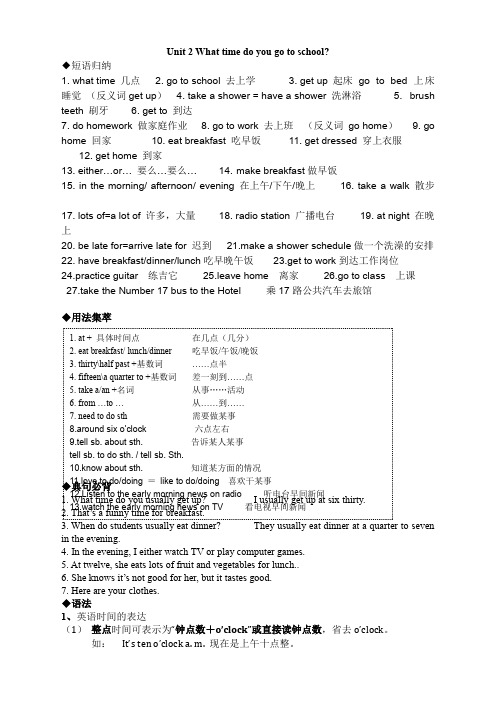
Unit 2 What time do you go to school?◆短语归纳1. what time 几点2. go to school 去上学3. get up 起床 go to bed 上床睡觉 (反义词get up )4. take a shower = have a shower 洗淋浴5. brush teeth 刷牙6. get to 到达7. do homework 做家庭作业 8. go to work 去上班 (反义词 go home ) 9. go home 回家 10. eat breakfast 吃早饭 11. get dressed 穿上衣服12. get home 到家13. either…or… 要么…要么… 14. make breakfast 做早饭15. in the morning/ afternoon/ evening 在上午/下午/晚上 16. take a walk 散步17. lots of=a lot of 许多,大量 18. radio station 广播电台 19. at night 在晚上20. be late for=arrive late for 迟到 21.make a shower schedule 做一个洗澡的安排22. have breakfast/dinner/lunch 吃早晚午饭 23.get to work 到达工作岗位24.practice guitar 练吉它 25.leave home 离家 26.go to class 上课27.take the Number 17 bus to the Hotel 乘17路公共汽车去旅馆◆用法集萃 ◆典句必背 1. What time do you usually get up? I usually get up at six thirty. 2. That’s a funny time for breakfast. in the evening.4. In the evening, I either watch TV or play computer games.5. At twelve, she eats lots of fruit and vegetables for lunch..6. She knows it’s not good for her, but it tastes good.7. Here are your clothes.◆语法1、英语时间的表达(1) 整点时间可表示为“钟点数+o’clock”或直接读钟点数,省去o’clock 。
初一下册英语第二单元知识点总结归纳

初一下册英语第二单元知识点总结归纳摘要:一、重点句型及回答1.询问喜好和习惯的句型:What do you like to do? / What habits do you have?2.描述他人喜好的句型:He/She likes to do sth./ He/She has the habit of doing sth.3.表达喜好的回答:I like / I don"t like4.表达习惯的回答:I have the habit of doing sth.二、疑问词和回答1.询问时间:What time do you ...?回答:I usually ...at .../ I often ...at ...2.询问地点:Where do you ...?回答:I ...at .../ I ...in ...三、日常用语和场景1.早上问候:Good morning!2.介绍:Hello, this is .../ Nice to meet you.3.感谢:Thank you / You"re welcome4.告别:Goodbye / See you later四、重点词汇1.学科:math / science / English / physical education2.日常活动:play sports / listen to music / read books / watch TV3.食物和饮料:hamburgers / hot dogs / pizza / juice / coffee正文:初一下册英语第二单元主要涵盖了日常交际用语、疑问词询问、表达喜好和习惯的句型以及日常场景对话等内容。
以下是对这些知识点的详细总结:一、重点句型及回答1.询问喜好和习惯的句型:What do you like to do? / What habits do you have?回答:I like playing sports./ I have the habit of reading books.2.描述他人喜好的句型:He/She likes to do sth./ He/She has the habit of doing sth.例如:My brother likes playing video games./ My sister has the habit of waking up early.3.表达喜好的回答:I like / I don"t like例如:I like pizza./ I don"t like coffee.4.表达习惯的回答:I have the habit of doing sth.例如:I have the habit of exercising every day.二、疑问词和回答1.询问时间:What time do you start school?回答:I start school at 7:30./ I usually start school at 7:30.2.询问地点:Where do you live?回答:I live in a apartment./ I live near the supermarket.三、日常用语和场景1.早上问候:Good morning, classmates!2.介绍:Hello, this is my new friend, Lisa./ Nice to meet you, Lisa.3.感谢:Thank you for helping me./ You"re welcome.4.告别:Goodbye, see you later! / See you tomorrow, classmates!四、重点词汇1.学科:math / science / English / physical education例如:My favorite subject is math./ She is good at English.2.日常活动:play sports / listen to music / read books / watch TV例如:I play soccer after school./ She likes to listen to music in her free time.3.食物和饮料:hamburgers / hot dogs / pizza / juice / coffee例如:My favorite food is pizza./ I drink coffee in the morning.通过学习初一下册英语第二单元的知识点,我们可以在日常生活中更好地与他人进行交流,了解彼此的喜好和习惯。
七年级英语下Unit 2 知识点归纳与复习人教新目标版

新目标七年级下Unit 2 知识点归纳与复习单元知识清单一、重点单词:1. libr r 图书馆2. rest rant 餐馆3. superm ket 超市4. str t 街道5. p k 公园6. c nt 中心7. br ge 桥8. n 在……附近9. acr 横过10. n xt 贴近11. betw n 在两者之间12. fr nt 前面13. t n 转弯14. l ft 左边15. r t 右边16. cl n 清洁的17. qu t 宁静的18. d ty 肮脏的19. h se 房子20. welc m 欢迎21. g den 花园22. enj 欣赏23. w k 散步24. thr 穿过25. begin 开始26. t 旅行27. v s t 参观28. pl ce 地方29. h gry 饥饿的30. a ive 到达31. w 路线32. t ke 乘, 坐33. t x 出租车34. airp t 飞机场35. p ss 通过36. h pe 希望二、必会短语1. post 邮局2. phone 投币式公用电话3. in of 在……前面4. on 在右边5. take 散步6. fun 玩得开心7. turn 向左转8. across 在……对面9. take 坐出租车10. have a 旅途愉快三、应知语法和句式:1. 表示在某地有某物用there be。
如:在这附近有一家银行。
a bank near here.2. There de 的一般问句是将be放到there的前面。
如:有一个超市吗?a supermarket?肯定回答是:Y es, .否定回答是:No, .3. 本课学习的两种问路方式:一种是:用Is there …? 如:在这附近有公用电话吗?a pay phone near here?另一种是:用Where is the …? 如:图书馆在哪?the library?4. welcome to …表示欢迎到某地。
最全面人教版七年级下册英语第二单元知识点归纳总结
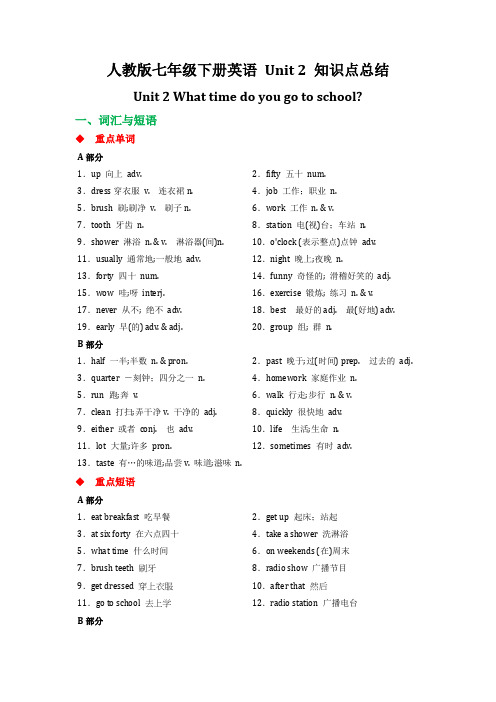
人教版七年级下册英语Unit 2 知识点总结Unit 2 What time do you go to school?一、词汇与短语◆重点单词A部分1.up 向上adv.2.fifty 五十num.3.dress穿衣服v. 连衣裙n.4.job 工作;职业n.5.brush 刷;刷净v. 刷子n.6.work 工作n. & v.7.tooth 牙齿n.8.station 电(视)台;车站n. 9.shower 淋浴n. & v. 淋浴器(间)n.10.o'clock (表示整点)点钟adv. 11.usually 通常地;一般地adv.12.night 晚上;夜晚n.13.forty 四十num.14.funny 奇怪的; 滑稽好笑的adj. 15.wow 哇;呀interj.16.exercise 锻炼; 练习n. & v. 17.never 从不; 绝不adv.18.best 最好的adj. 最(好地) adv. 19.early 早(的) adv. & adj.20.group 组; 群n.B部分1.half 一半;半数n. & pron.2.past 晚于;过(时间) prep. 过去的adj. 3.quarter ―刻钟;四分之一n.4.homework 家庭作业n.5.run 跑;奔v.6.walk 行走;步行n. & v.7.clean 打扫;弄干净v. 干净的adj.8.quickly 很快地adv.9.either 或者conj. 也adv.10.life 生活;生命n.11.lot 大量;许多pron.12.sometimes 有时adv.13.taste 有…的味道;品尝v. 味道;滋味n.◆重点短语A部分1.eat breakfast 吃早餐2.get up 起床;站起3.at six forty 在六点四十4.take a shower 洗淋浴5.what time 什么时间6.on weekends (在)周末7.brush teeth 刷牙8.radio show 广播节目9.get dressed 穿上衣服10.after that 然后11.go to school 去上学12.radio station 广播电台B部分1.go home 回家2.go to Bob's home 去鲍勃家3.do (one's) homework 做作业4.clean sb.'s room 打扫某人的房间5.eat dinner 吃晚饭6.half an hour 半个小时7.go to bed 上床睡觉8.get home 到家9.play/do sports 做运动10.lots of 大量;许多11.a healthy life 一个健康的生活12.be good for 对…有好处13.take a walk 散步;走一走14.taste good 尝起来味道好15.get home from school 从学校回到家16.at a quarter past three in the afternoon 在下午三点一刻17.either…or…要么…要么…; 或者…或者…18.at a quarter to seven in the evening 在晚上差一刻七点19.at half past six in the morning 在早晨六点半◆重点句子A部分1.—What time do you usually get up,Rick? 里克,你通常几点起床?—I usually get up at six thirty. 我通常6:30起床。
人教版七年级英语下册第二单元知识点汇总总结
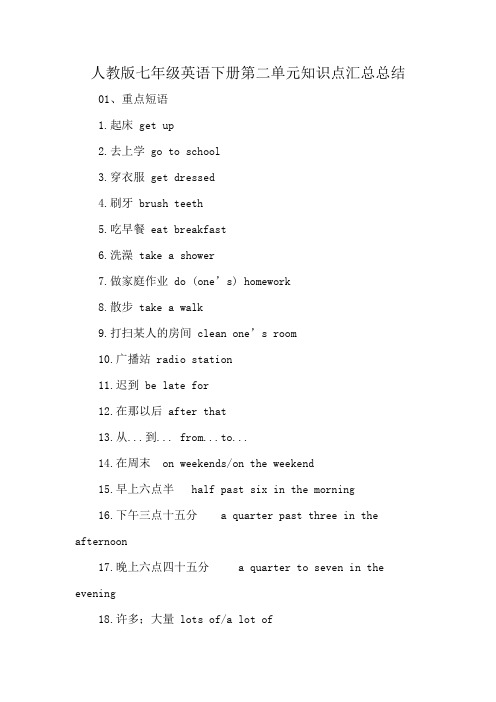
人教版七年级英语下册第二单元知识点汇总总结01、重点短语1.起床 get up2.去上学 go to school3.穿衣服 get dressed4.刷牙 brush teeth5.吃早餐 eat breakfast6.洗澡 take a shower7.做家庭作业do (one’s) homework8.散步 take a walk9.打扫某人的房间clean one’s room10.广播站 radio station11.迟到 be late for12.在那以后 after that13.从...到... from...to...14.在周末 on weekends/on the weekend15.早上六点半 half past six in the morning16.下午三点十五分 a quarter past three in the afternoon17.晚上六点四十五分 a quarter to seven in the evening18.许多;大量 lots of/a lot of19.要么...要么... either...or...20.对...有好处 be good for21.尝起来味道好 taste good22.过健康的生活 have/live a healthy life 02、重点句子Grammar Focus 句子1. 你通常几点起床?What time do you usually getup?2.我通常六点三十起床。
I usually get up at six thirty.3.他们几点穿衣服?What time do they get dressed?4.他们总是在七点二十穿衣服。
They always get dressed at seven twenty.5.里克几点吃早饭?What time does Rick eat breakfast?6.他七点钟吃早餐。
七下英语二单元语法

七下英语二单元语法
摘要:
一、七年级下册英语第二单元语法概述
1.单元主题
2.语法知识点
二、动词的一般现在时
1.动词的一般现在时构成
2.一般现在时的疑问句与否定句
三、动词的一般过去时
1.动词的一般过去时构成
2.一般过去时的疑问句与否定句
四、情态动词can的用法
1.can的肯定句与否定句
2.can的一般疑问句
五、日常交际用语
1.问候与介绍
2.道别与应答
正文:
七年级下册英语第二单元语法主要涉及动词的一般现在时、一般过去时以及情态动词can的用法,同时学习日常交际用语。
首先,本单元的主题是关于日常交际,通过学习不同场景下的问候、介
绍、道别等用语,提高学生的口语表达能力。
在此基础上,本单元还涉及动词的一般现在时和一般过去时,帮助学生更好地描述动作的发生时间。
在动词时态方面,一般现在时表示现在的习惯、事实或一般情况。
其构成是动词原形,如:I study English every day.一般过去时则表示过去某个特定时间发生的动作,其构成是动词过去式,如:I studied English yesterday.在学习这两个时态时,学生还需掌握疑问句和否定句的构成方法。
此外,本单元还讲解了情态动词can的用法。
can表示能力或允许,用于疑问句时,用can you提问;用于否定句时,用can"t表示不能,如:I can"t swim.对于can的一般疑问句,疑问部分用can you,肯定回答为Yes,I can;否定回答为No,I can"t。
七年级下册人教版英语unit2知识点
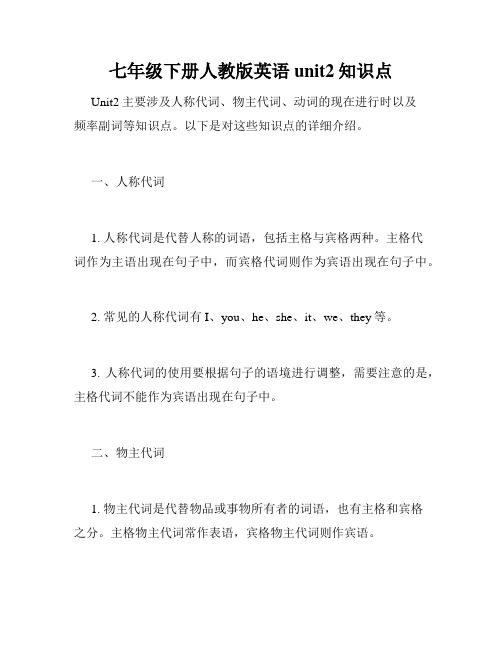
七年级下册人教版英语unit2知识点Unit2主要涉及人称代词、物主代词、动词的现在进行时以及频率副词等知识点。
以下是对这些知识点的详细介绍。
一、人称代词1. 人称代词是代替人称的词语,包括主格与宾格两种。
主格代词作为主语出现在句子中,而宾格代词则作为宾语出现在句子中。
2. 常见的人称代词有I、you、he、she、it、we、they等。
3. 人称代词的使用要根据句子的语境进行调整,需要注意的是,主格代词不能作为宾语出现在句子中。
二、物主代词1. 物主代词是代替物品或事物所有者的词语,也有主格和宾格之分。
主格物主代词常作表语,宾格物主代词则作宾语。
2. 常见的物主代词有my、your、his、her、its、our、their等。
3. 物主代词的使用也要根据句子的语境进行调整,要尽可能在句子中避免重复使用物主代词。
三、动词的现在进行时1. 现在进行时表示现在正在进行的动作,通常由“be + 现在分词”构成。
2. 现在分词的构成:一般情况下,在动词原形的基础上加ing。
但也有一些规则需要注意,如:以不发音的“e”结尾的动词,将“e”去掉再加ing。
以重读闭音节结尾,且末尾只有一个辅音字母的动词,双写末尾字母再加ing。
以“y”结尾的动词,将“y”变成“i”再加ing。
3. 现在进行时要注意的问题:一是不要过度使用现在进行时,二是要注意现在进行时和现在简单时的区别。
四、频率副词1. 频率副词用来描述动作发生的频率,表示有多少次,有多长时间一次或者几率有多大。
2. 常见的频率副词有always、usually、often、sometimes、seldom、hardly ever、never等。
3. 在句中,频率副词通常放在行为动词之前,be动词之后,如:I usually go to school by bike. He is always late for class.总的来说,Unit2涉及的知识点较为基础但重要,要牢记每一个知识点的用法,通过大量的练习来加深对这些知识的理解和掌握。
人教版英语七年级下册Unit2知识点精析+课文注释

人教版英语七年级下册Unit2知识点精析+课文注释Section A重点单词dress穿衣服;连衣裙up向上brush刷;刷净;刷子tooth牙齿shower淋浴;淋浴器(间)usually 通常地;一般地forty 四十never从不;绝不fifty五十early早(的)job工作;职业work工作o'clock(表示整点)……点钟station电(视)台;车站night晚上;夜晚funny 奇怪的;滑稽好笑的exercise锻炼;练习best最好的;最好地;最group组;群重点短语get up起床;站起go to school去上学get dressed 穿上衣服brush teeth 刷牙eat breakfast 吃早饭take a shower 洗淋浴radio station 广播电台at night 在晚上go to work 去上班be late for 迟到on weekends (在)周末重点句型1.-What time do you usually get up,Rick?里克,你通常几点起床?-I usually get up at six thirty.我通常6:30起床。
2.I never get up so early.我从不那么早起床。
3.That's funny time for breakfast!那个时间吃早饭真有意思呀!4. After that, I usually exercise at about ten twenty.在那之后,我通常在10:20左右锻炼。
Section B重点单词half一半;半数past晚于;过(时间);过去的quarter一刻钟;四分之一homework家庭作业clean打扫;弄干净;干净的run跑;奔walk行走;步行quickly 很快地either或者;也(用在否定词组后)lot大量;许多sometimes有时taste有……的味道;品尝;味道;滋味life生活;生命重点短语do(one’s) homework做作业go to bed 上床睡觉take a walk 散步;走一走play sports 做运动get home 到家either...or... 要么......要么......;或者......或者......lots of 大量;许多from...to...从......到......重点句型1.When do students usually eat dinner?学生们通常什么时候吃晚饭?2. In the evening, I either watch TV or play computer games.在晚上,我要么看电视,要么玩电脑游戏。
(必考题)初中英语七年级下册Unit 2知识点复习
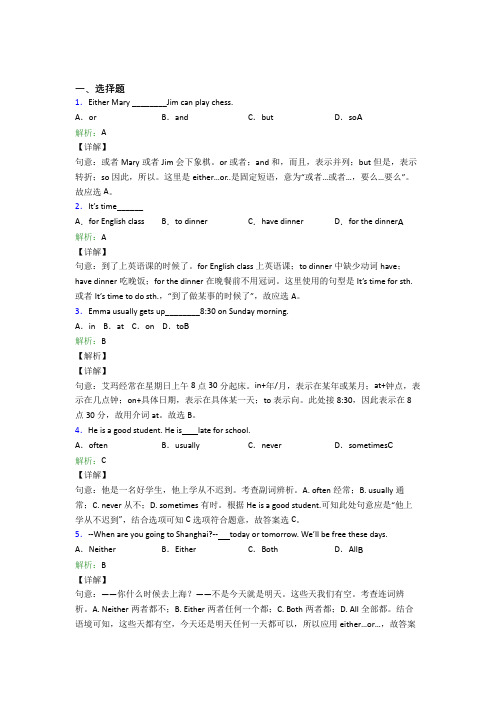
一、选择题1.Either Mary ________Jim can play chess.A.or B.and C.but D.so A解析:A【详解】句意:或者Mary或者Jim会下象棋。
or或者;and和,而且,表示并列;but但是,表示转折;so因此,所以。
这里是either…or..是固定短语,意为“或者…或者…,要么…要么”。
故应选A。
2.It’s time______A.for English class B.to dinner C.have dinner D.for the dinner A解析:A【详解】句意:到了上英语课的时候了。
for English class上英语课;to dinner中缺少动词have;have dinner吃晚饭;for the dinner在晚餐前不用冠词。
这里使用的句型是It’s time for sth.或者It’s time to do sth.,“到了做某事的时候了”,故应选A。
3.Emma usually gets up________8:30 on Sunday morning.A.in B.at C.on D.to B解析:B【解析】【详解】句意:艾玛经常在星期日上午8点30分起床。
in+年/月,表示在某年或某月;at+钟点,表示在几点钟;on+具体日期,表示在具体某一天;to表示向。
此处接8:30,因此表示在8点30分,故用介词at。
故选B。
4.He is a good student. He is late for school.A.often B.usually C.never D.sometimes C解析:C【详解】句意:他是一名好学生,他上学从不迟到。
考查副词辨析。
A. often经常;B. usually通常;C. never从不;D. sometimes有时。
根据He is a good student.可知此处句意应是“他上学从不迟到”,结合选项可知C选项符合题意,故答案选C。
七年级下册英语unit2知识点思维导图
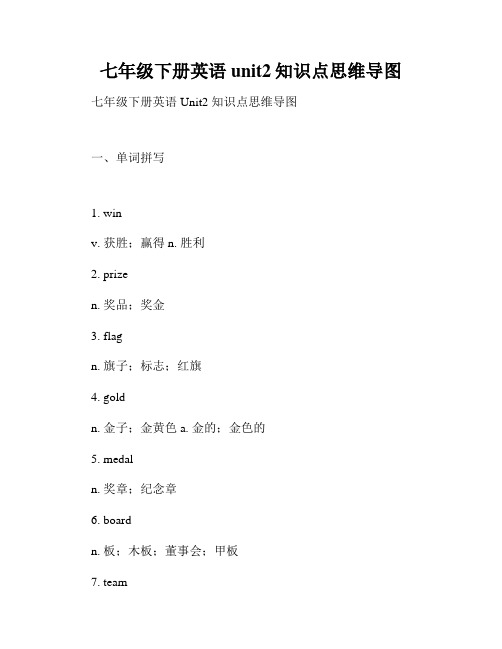
七年级下册英语unit2知识点思维导图七年级下册英语Unit2 知识点思维导图一、单词拼写1. winv. 获胜;赢得 n. 胜利2. prizen. 奖品;奖金3. flagn. 旗子;标志;红旗4. goldn. 金子;金黄色 a. 金的;金色的5. medaln. 奖章;纪念章6. boardn. 板;木板;董事会;甲板7. teamn. 队;团队 v. 合作;组成团队8. scoren. 得分;分数;乐谱 v. 得分;记分9. beatv. 打败;敲打;跳动;搅拌 n. 敲打声10. matchn. 比赛;对手;火柴 v. 相配;使相配;配对11. athleten. 运动员;体育家二、动词语态1. 主动语态英语中的主动语态是指主语是动作的执行者。
2. 被动语态英语中的被动语态是指主语是动作的承受者。
三、时态1. 现在时表示目前正在发生或存在的动作或状态。
2. 过去时表示过去发生或存在的动作或状态。
3. 将来时表示将要发生的动作或存在的状态。
4. 现在进行时表示现在正在进行的动作或存在的状态。
5. 过去进行时表示过去正在进行的动作或存在的状态。
四、形容词和副词1. 形容词形容词是用来描述事物特征的词语。
2. 副词副词是用来描述行为的方式、程度、时间、场合等的词语。
五、比较级和最高级1. 比较级用来对两个物品进行比较的形式,比较级通常用于表示更高一级或者更多一点。
2. 最高级用来对三个或三个以上的物品进行比较的形式,最高级通常用于表示最高一级或者最多一点。
六、语法1. 代词代词是替代名词的词语。
2. 名词所有格名词所有格是指定一个名词或名词短语所属或关联的形式。
3. 并列连接词并列连接词是用于连接两个或更多相同类型的词、短语、句子或从句的词汇。
4. 祈使句祈使句是指用来表达请求、命令和建议的句子类型。
七、术语1. basket- 盯人防守时的篮球术语2. dribble- 篮球术语,控球时的运球3. foul- 篮球术语,犯规4. layup- 篮球术语,上篮5. rebound- 篮球术语,篮板球6. zone- 篮球术语,防守区以上就是七年级下册英语Unit2 的知识点思维导图,希望大家在学习过程中可以更加清晰明了的掌握这些知识点。
外研版七年级下册英语语法专题复习(含练习) (2)

外研版|七年级下册重点知识点梳理1)物主代词:表示所属关系的代词(…属于谁的)形容词性物主代词和名词性物主代词的关系:形容词性物主代词:必须和名词在一起。
My father, your teacher... 物主代词名词性物主代词:相当于与之相对应的形容词性物主代词+名词。
This shirt is mine. =This is my shirt.练习(1)选择题。
()1. Look at .A. himB. heC. his()2. I drive to the park every day.A. theyB. theirC. them()3. classroom is big.A. weB. usC. Our()4. I love .A. sheB. herC. hers()5. Do you know ?A. IB. myC. me()6. I am son.A. theyB. theirC. them()7. This is not _____ desk.. My desk is over there.A. IB. myC. me()8. -Can you spell _____ name, Harry? -Sorry.A. youB. yourC. yours()9. Tom and Jack are brothers. This is _____ room.A. theyB. themC. their()10. We are in the same class. _____ classroom is very nice.A. ourB. myC. ours()11. Mrs. Green is my teacher. I’m _____ student.A. heB. hisC. him()12. That’s a cat. _____ name is Mimi.A. ItB. It’sC. Its(2)用括号里的代词的适当形式填空1, Mr Yang is _______【we】teacher.________【him】is from Beijing. _______【his】teaches______【our】English.2, Look,there is a cat._______【they】is Lily's.____【it】name is Mimi.3, Let______【I】tell ______【she】about_____【he】life at school.4, This is ______【they】room.Where is _____【our】?5, Don't use the eraser.______ is ______【me】.6, The lady under the tree is ______【me】aunt._____【her】often sings with _____【she】husband2)情态动词can1.含义:表达人或物的能力,能或会…2.特点:情态动词can没有人称和数的变化,之后要加动词原形。
- 1、下载文档前请自行甄别文档内容的完整性,平台不提供额外的编辑、内容补充、找答案等附加服务。
- 2、"仅部分预览"的文档,不可在线预览部分如存在完整性等问题,可反馈申请退款(可完整预览的文档不适用该条件!)。
- 3、如文档侵犯您的权益,请联系客服反馈,我们会尽快为您处理(人工客服工作时间:9:00-18:30)。
新目标英语七年级下册知识点总结Unit 1 Can you play the guitar?1,情态动词+V 原can do= be able to do2,Play+ the+ 乐器+球类,棋类3,join 参加社团、组织、团体4, 4个说的区别:say+内容Speak+语言Talk 谈论talk about sth talk with sb talk to sbTell 告诉,讲述tell sb (not)to do sthTell stories/ jokes5,want= would like + (sb)to do sth6,4 个也的区别:too 肯定句末(前面加逗号)Either 否定句末(前面加逗号)Also 行前be 后As well 口语中(前面不加逗号)7,be good at+ V-ing=do well in 擅长于be good for 对…有益(be bad for对…有害)be good to 对…友好(good 可用friendly , nice, kind 替换)be good with 和…相处好=get on/ along well with8,特殊疑问句的构成:疑问词+一般疑问句9, How/ what about+V- ing …怎么样?(表建议)10,感官动词(look, sound, taste, smell, feel )+adj/ like11,选择疑问句:回答不能直接用Yes或者No,要从中选择一个回答12,students wanted for school show(wanted 表示招募,含有被动意义)13, show sth to sb=show sb sth give sth to sb=give sb sth14, help sb (to)do sthHelp sb with sthWith sb's help= with the help of sbHelp oneself to 随便享用15, be busy doing sth/ be busy with sth16, need to do sth17, be free= have time18, have friends= make friends19, call sb at + 电话号码20, on the weekend= on weekends21, English-speaking students 说英语的学生(带有连词符,有形容词性质)22, do kung fu 表演功夫Unit 2 What time do you go to school ?1 , 问时间用what time 或者whenAt+ 钟点at 7 o'c lock at noon/ at night (during/ in the day )On+ 具体某天、星期、特指的一天on April 1 st on Sunday on a cold winter morning In + 年、月、上午、下午、晚上2, 时间读法:顺读法逆读法:分钟w 30 用past five past eight (8:05)half past eight (8:30)分钟〉30 用to a quarter to ten (9:45)整点用 …o'c lock 7 o'clock (7:00)3, 3 个穿的区别: wear 表状态,接服装、手套、眼镜、香水等 Put on 表动作,接服装 Dress 表动作,接 sb/ on eselfget dressed 穿衣 3, 感叹句: How+adj+ 主谓!How+adj+a/an +n 单 +主谓!What+ a/an +adj+ n 单+主谓! What+ adj+ n 复/ 不可数 +主谓!4, from …to …5, be/ arrive late for6, 频度副词(行前 be 后)Always usually often sometimes seldom 7,一段时间前面要用介词 for for half an hour 8, eat/ have … forbreakfast/ lunch/ dinner/ supper 9, either …or10, a lot of=lots of11, it is +adj+for sb +to do sth ( adj 修饰 to do sth ) It is important for me to learn English.it is +adj+of sb +to do sth (adj 修饰 sb ) It is kind/ friendly/ nice of you to help me. Unit 3 How do you get to school ?1, 疑问词How 如何(方式)how long 多长(时间)答语常用“ (For/ about + )时间段”how far 多远(距离)答语常用“ ( It c s + )数词 +miles/ meters/ kilometers ”how often 多久一次(频率)答语常用“ Always/ often/ every day/ …”或 “次数 +时间”等表频率的状语How soon 多快,多久以后,常用在将来时中。
答语常用“ in +时间段”how many 多少(接可数名词) how much (接不可数名词)why 为什么(原因) what 什么 when 何时who 谁whom 谁(宾格)(针对宾语提问也可用 who ) whose 谁的2, 宾语从句要用陈述句语序3, Stop sb from doing sthStop to do 停下来去做其他事Stop doing 停止正在做的事4, what do you think of/ about …? = how do you like …?你认为…怎么样?5, He is 11 years old.He is an 11-year-old boy.6, many students= many of the students7, be afraid of sth be afraid to do sth worry aboutbe worried about 担心8, play with sb9, come true10, have to do sth11, he is like a father to me ( like 像)12, leave 离开 leave for 出发前往某地13, cross 是动词 across 是介词14, thanks for +n/ V-ingThanks for your help/ thanks for helping me.Thanks for your invitation/ thanks for inviting/ asking me.Thanks to 幸亏,由于,因为15,4 个花费:人 +spend/ spends/ spent+时间 /钱 + (in ) doing sth/ on sth人+pay/ pays/ paid + 钱 +for sthIt takes/ took sb + 时间 +to do sthhardly never for five minutes物+cost/ costs/ cost +sb + 钱16,交通方式•用介词。
在句子中做方式状语。
①by +交通工具名词(中间无需任何修饰)By bus/ bike/ car/ taxi/ ship/ boat/ pla ne/ subway/ train .....②by +交通路线的位置By land/ water/ sea/ air③in/ on + 冠词/物主代词/指示代词+交通工具名词In a/ his/ the carOn a/ his/ the bus/ bike/ship/ train/ horse/ motorbike④on foot 步行•用动词。
在句子中做谓语。
①take + a/ the + 交通工具名词take a bus/ plane/ ship/ trainride a bike②walk/ drive/ ride/ fly to ...... (后面接here , there , home等地点副词时,省略介词to。
)如步行回家:walk home17,名词所有格一般情况加 's Tom ' s pen以s 结尾力口 ' the teachers ' office ten days ' holiday表示几个人共同拥有,在最后一个名词后加' s Mike and John ' s desk 表示每个人各自拥有,在每个名词后加 ' s Mike ' s and John ' s desksUnit 4 Don 'teat in class.1,祈使句(变否定在句首+don't)Be 型( be +表语),否定形式:don't+ be +表语Be quiet,please. Don'tbe late!Do型(实义动词+其他),否定形式:don 't+实义动词+其他Come here,please. Don'tplay football here.Let 型(let sb do sth),否定形式:don 't+ let sb do sth 或者let sb not do sthNo+n/ V-ing No photos /mobile ;No parking/ smoking/ spitting/ talking/ picking of flowers2,in class 在课堂上in the classroom 在教室3,be on time 准时4,listen to music5,( have a) fight with sb7,eat outside8,Must 与have to(1)must 表示说话人主观上的看法,意为“必须” 。
have to 表示客观的需要或责任,意为“不得不,必须” ,后接动词原词。
(2)must没有人称,时态和数的变化Have to有人称,数,时态的变化,其第三人称单数形式为has to,过去式为had to.构成否定句或疑问句时借助动词do/ does。
(3)have to 的否定式是need n'=do n' A does n'thave to (不必要);must 的否定式是must not/ must n't (—定不能,不允许)。
